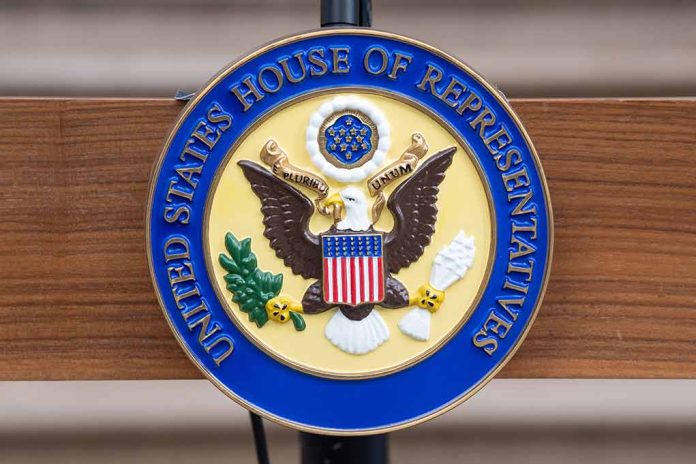
The House voted 217-211 to overturn a Biden administration rule limiting bank overdraft fees to $5, sending the resolution to the President’s desk where its future remains uncertain.
Key Takeaways
- The House followed the Senate in voting to overturn Biden’s rule limiting bank overdraft fees, with the measure passing 217-211.
- Republicans argue the regulation would force banks to limit overdraft protection and restrict credit access, while Democrats claim it protects consumers from exploitative charges.
- America’s largest banks currently earn approximately $8 billion annually from overdraft fees, which can reach $35 per transaction.
- The rule would have applied to banks and credit unions with over $10 billion in assets, offering them three fee options including a flat $5 charge.
- Critics of the repeal warn consumers may turn to less-regulated, higher-risk lenders for emergency expenses without these protections.
Congressional Action Against Fee Regulations
The House of Representatives delivered a significant blow to the Biden administration’s consumer protection agenda by voting to overturn a rule that would have limited bank overdraft fees. Following the Senate’s lead, the House passed the resolution with a narrow 217-211 vote, largely along party lines. The measure now heads to the White House, where President Trump will decide whether to veto the resolution or allow the regulation to be overturned. The Congressional Review Act provided Republicans with the legislative mechanism to challenge the rule, which had been designed to cap excessive overdraft charges that can disproportionately impact financially vulnerable Americans.
House votes to overturn Biden-era rule limiting bank overdraft fees to $5, sends to Trump to sign https://t.co/BevPEfyWRH pic.twitter.com/WX4RIEUhvk
— darlene superville (@dsupervilleap) April 10, 2025
At the center of the dispute is the Consumer Financial Protection Bureau’s rule that would have capped overdraft fees at $5 per transaction for financial institutions with assets exceeding $10 billion. Currently, these fees can reach as high as $35 per transaction, creating a substantial revenue stream for banks. The nation’s largest financial institutions collect approximately $8 billion annually from overdraft fees alone, with no legal maximum on what they can charge consumers who spend beyond their account balances. The rule was scheduled to take effect in October 2025, giving banks time to adjust their practices.
Republican Opposition to Fee Limitations
Republican lawmakers have staunchly opposed the fee limitations, arguing that government price controls would harm both financial institutions and consumers. Arkansas Representative French Hill, a leading voice against the regulation, emphasized the importance of market-based solutions over government mandates. His position reflects the broader Republican view that excessive regulation restricts economic freedom and interferes with proper market functioning. Opponents of the rule contend that limiting overdraft fees would force banks to eliminate overdraft protection services entirely, potentially leaving consumers with fewer options during financial emergencies.
Banking industry representatives have echoed these concerns, with American Bankers Association president Rob Nichols warning that without access to overdraft protection, consumers might turn to less regulated and higher-risk non-bank lenders to cover unexpected expenses. The rule would have affected approximately 175 financial institutions nationwide, representing about 70% of all bank deposits. Banks argue that overdraft services provide a valuable safety net for consumers who might otherwise face declined transactions, returned checks, and additional merchant fees when their accounts are overdrawn.
Democratic Defense of Consumer Protections
Democrats have vigorously defended the overdraft fee rule as a necessary consumer protection measure. They argue that these fees have evolved from their original purpose of preventing bounced checks into a significant profit center for banks that disproportionately affects cash-strapped customers. The regulation would have allowed banks to choose from three fee options, including a flat $5 fee, a fee based on the actual cost to the bank for processing overdrafts, or a fee equal to the amount by which the account was overdrawn. These options were designed to maintain the overdraft service while eliminating what the Biden administration characterized as excessive charges.
California Representative Maxine Waters, a prominent Democratic voice on financial issues, expressed frustration with these charges, stating that Americans are “fed up with these junk fees.” Other Democrats, including Michigan Representative Rashida Tlaib, criticized the Republican-led effort to overturn the rule as “shamefully targeting the American people” and protecting bank profits at the expense of vulnerable consumers.
Sources:
House votes to overturn Biden-era rule limiting bank overdraft fees to $5, sends to Trump to sign
House votes to overturn Biden-era rule limiting bank overdraft fees to $5, sends to Trump to sign
House Votes to Overturn Biden-era Rule Limiting Bank Overdraft Fees



